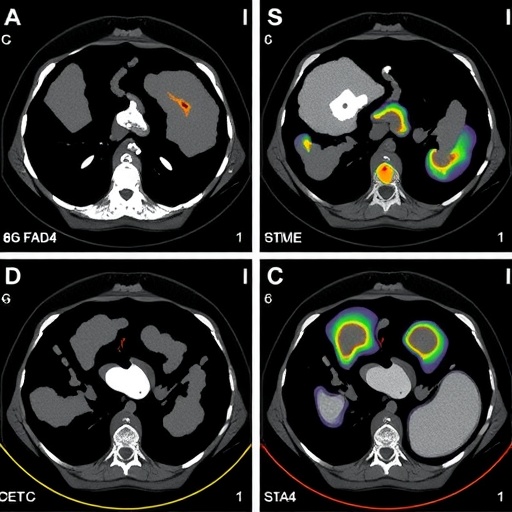In a significant advance within oncological imaging, recent studies have highlighted the comparative efficacy of a cutting-edge radiotracer, Gallium-68 (68Ga) labeled Fibroblast Activation Protein Inhibitor (FAPI), particularly using the 68Ga-FAPI-04 compound in positron emission tomography/computed tomography (PET/CT) scans. This innovative approach has shown remarkable potential in the evaluation of peritoneal metastases stemming from gastrointestinal cancers, which remain a challenging aspect of cancer diagnosis and management. The study, conducted by Zhou, Zhao, Shuai, and colleagues, seeks to illuminate the distinct advantages of this imaging modality over conventional contrast-enhanced computed tomography (CECT).
Peritoneal metastasis occurs when cancer cells spread to the lining of the abdominal cavity, often signifying advanced disease and heralding a poor prognosis. Traditional imaging techniques, including CECT, have long been employed to detect these metastatic lesions, yet they often fall short in accuracy and sensitivity. The introduction of 68Ga-FAPI-04 PET/CT represents a paradigm shift in this context, highlighting the importance of fibroblast activation in the tumor microenvironment and its utility as a healing component to target cancerous cells.
Fibroblast Activation Protein (FAP) is a membrane-bound serine protease that is typically overexpressed in cancerous tissues. This overexpression facilitates the identification of tumors via radiolabeled inhibitors, improving the specificity of imaging techniques. By utilizing 68Ga-FAPI-04, clinicians can achieve enhanced visualization of peritoneal carcinomatosis, allowing for improved diagnostic accuracy that could directly impact treatment decisions. This research underscores not only the robustness of this novel tracer but also its potential to redefine the clinical pathways for managing patients with gastrointestinal malignancies.
In their exploration, Zhou and colleagues conducted a comparative analysis of 68Ga-FAPI-04 PET/CT against the traditional CECT method. Patients with known gastrointestinal cancers were enrolled in the study, and both imaging modalities were performed to assess the presence and burden of peritoneal metastases. The results were illuminating, revealing that 68Ga-FAPI-04 PET/CT surpassed CECT in detecting smaller peritoneal lesions, elucidating the complex narrative of cancer spread that traditional imaging often misses.
The accuracy of any imaging modality is of paramount importance in guiding clinical decisions. The findings from this study suggest that 68Ga-FAPI-04 PET/CT not only provides superior imaging capabilities but may also lead to alterations in therapeutic strategies. This shift is critical, as identifying peritoneal metastases early can significantly alter treatment approaches, guiding decisions around surgical interventions, systemic therapies, and palliative care.
Moreover, the implications of this study extend beyond mere detection. The incorporation of advanced imaging techniques such as 68Ga-FAPI-04 PET/CT into routine clinical practice could expedite the process of decision-making in oncology. Physicians could quickly identify the extent of metastatic disease, allowing for individualized treatment plans that align with the specific metastatic profile of the patient. This could enhance the efficacy of personalized medicine, optimizing therapeutic outcomes based on precise imaging.
Additionally, the exploratory nature of the research emphasizes the evolving landscape of oncology, where innovative imaging plays an integral role in the management of cancer. With the potential to monitor treatment responses and disease progression, advanced imaging technologies like 68Ga-FAPI-04 PET/CT offer a glimpse into the future of cancer diagnostics. The integration of such modalities could empower healthcare providers with critical information, leading to more informed decisions and better patient outcomes.
As the landscape of cancer care continues to evolve, the promise of 68Ga-FAPI-04 PET/CT embodies a significant leap forward. For individuals battling gastrointestinal cancers, the prospect of using an imaging technique that provides greater accuracy and aligns closely with the biological characteristics of their tumors is not just hopeful; it is a beacon of emerging possibilities. The urgent need for improved diagnostic tools is underscored by the relentless nature of these cancers and their often grim prognosis, making the findings from this research particularly salient.
Furthermore, the focus on patient outcomes as a measure of clinical efficacy indicates a shift towards a holistic approach in cancer care. The research conducted by Zhou et al. carries the implication that not only can we detect cancer with greater precision, but we can also tailor our interventions to maximize benefit—a critical consideration in the era of personalized medicine. The role of radiotracers in guiding treatment paradigms is increasingly evident, revealing a multidimensional approach to combating cancer that encompasses cutting-edge technology, biological insight, and patient-centered care.
In light of these findings, the adoption of 68Ga-FAPI-04 PET/CT in clinical settings appears imminent. As oncologists consider the best strategies to enhance patient management, it is vital that they embrace innovations backed by rigorous research. The potential for this imaging technique to influence clinical decision-making is profound, potentially transforming the landscape of diagnostic oncology.
As we conclude this exploration of the promising findings by Zhou and colleagues, it is essential to highlight the broader implications of this research. If validated in larger studies and integrated into clinical guidelines, 68Ga-FAPI-04 PET/CT could redefine the standard of care for patients with gastrointestinal cancers facing peritoneal metastasis. The future of cancer imaging looks promising, and with continued investigation into novel tracers like 68Ga-FAPI-04, we may be entering a new era where early detection and precise treatment become the norm rather than the exception.
In summary, the compelling evidence presented in this research reinforces the extraordinary potential of advanced imaging techniques in bridging gaps within cancer diagnosis and treatment. The study serves as a critical milestone in fostering a deeper understanding of metastatic disease, ultimately empowering clinicians and improving outcomes for countless patients navigating the complexities of gastrointestinal cancers.
Subject of Research: Evaluation of peritoneal metastases from gastrointestinal cancers using 68Ga-FAPI-04 PET/CT versus CECT.
Article Title: Comparison of 68Ga-FAPI-04 PET/CT with CECT in the evaluation of peritoneal metastases from gastrointestinal cancers and impact on clinical decision-making.
Article References:
Zhou, Y., Zhao, Y., Shuai, D. et al. Comparison of 68Ga-FAPI-04 PET/CT with CECT in the evaluation of peritoneal metastases from gastrointestinal cancers and impact on clinical decision-making.
J Cancer Res Clin Oncol 151, 201 (2025). https://doi.org/10.1007/s00432-025-06237-3
Image Credits: AI Generated
DOI: 10.1007/s00432-025-06237-3
Keywords: 68Ga-FAPI-04 PET/CT, peritoneal metastases, gastrointestinal cancers, contrast-enhanced computed tomography, clinical decision-making, oncology imaging.




